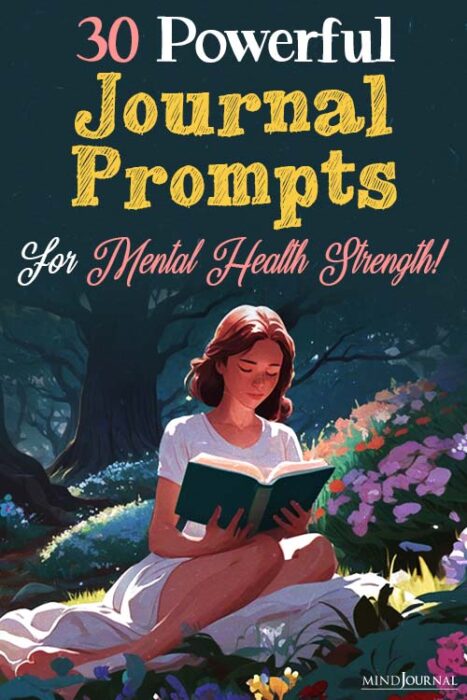Welcome to a journey of self-discovery and mental well-being! Many people resort to journaling as a method to take care of their mental health—it’s like a safe house for expressing feelings and evaluating oneself.
If you’re here with us, you are most likely interested in prioritizing your mental well-being. For this reason we have curated an exhaustive list of journal prompts for mental health strength, just for you!
Journaling enables you to organize your thoughts, get some clarity, and increase your mindfulness and self-awareness. Let’s explore the concept of journaling and understand how it can do miracles on your mental health.
What Are Journal Prompts
Journal prompts for mental health are sparks that can ignite your personal journal writing. These come in the form of questions, suggestions, or ideas and they push you to write.

For example, there might be specific questions to which answers you need to think about a certain topic in your life. On the other hand, others might simply be more general and urge you to investigate anything under the sun.
They encourage self-reflection through which people delve into their thoughts, emotions, and experiences. This process brings about self-awareness which facilitates identification of patterns as well as triggers.
Some prompts on the other hand are based on gratitudes oriented towards fostering positive thinking by recognizing good things about oneself.
Journal prompts work like a caring friend in one’s pursuit of sound mental health; they provide structured but flexible ways to practice self-help as well as self-reflection.
Read More: 5 Types Of Prompts Therapists Use As A Part Of ABA Therapy
How To Use Journal Prompts
Exploring yourself through daily reflections is beneficial, but journal prompts for mental health, goes beyond mere event logging. For those aiming to cultivate a writing routine but struggle with content ideas journal prompts can be a massive boon!

When there’s a jumble of conflicting thoughts, prompts offer a structured way to unravel them. If you feel like you could write endlessly and need help honing in on specific areas.
Additionally, learning how to use journal prompts become a supportive tool for:
- Establishing a writing routine without grappling for topics.
- Sorting through complex emotions and conflicts with prompts tailored to specific situations.
- Gaining clarity on relationship challenges and emotional needs.
Remember, the effectiveness of what are journal prompts often lies in regular practice, even if it’s not a daily commitment. Opt for a realistic schedule, like three days a week, choosing a different prompt each day to guide your reflections.
This approach not only streamlines your thoughts but also ensures meaningful and purposeful journaling sessions.
Read More: 5 Benefits Of A Regular Exercise Routine For Mental Health
Journal Prompts For Mental Health
The initial set of ten journaling prompts for mental health takes a lighter approach, serving as a gentle introduction to self-reflection. These journal prompts for mental health will provide you with a comfortable safe space to express your feelings and information.
1. “Explore a recent challenge you faced. How did you navigate it, and what did you learn about your problem-solving skills?”
Purpose: Encourages self-reflection on overcoming difficulties, promoting a positive outlook on problem-solving abilities.
2. “Describe a moment that brought you pure joy. What elements contributed to this happiness, and how can you replicate them?”
Purpose: Promotes gratitude and self-awareness, helping identify sources of joy for future well-being.
3. “Write about a goal you’re currently working on. What steps can you take to make progress, and how does this goal align with your values?”
Purpose: Fosters goal-oriented thinking, providing clarity on actionable steps and aligning goals with personal values.
Read More: How To Set Goals In Life: 7 Goal-Setting Strategies
4. “Reflect on a setback you experienced. How can you reframe this situation to find lessons and foster personal growth?”
Purpose: Encourages a positive perspective on setbacks, turning them into opportunities for learning and development.

5. “Consider a person who inspires you. What qualities do they possess, and how can you incorporate these attributes into your own life?”
Purpose: Promotes self-improvement by identifying and integrating positive qualities from admired individuals.
6. “Write a letter to your future self. What aspirations, advice, or encouragement would you offer to the person you aim to become?”
Purpose: Encourages long-term thinking, self-motivation, and a positive outlook on personal growth.
7. “Explore a self-care ritual that brings you peace. How can you prioritize and incorporate more of these moments into your routine?”
Purpose: Emphasizes the importance of self-care, guiding the creation of a balanced and nurturing daily routine.
8. “Describe a childhood memory that holds significance. What lessons or insights from that moment can you apply to your present life?”
Purpose: Encourages reflection on formative experiences, extracting valuable lessons for current decision-making and growth.
Read More: What Is Childhood Trauma? 4 Signs of Lingering Childhood Hurt
9. “Reflect on a recent experience that made you laugh or smile. How can you infuse more moments of joy into your daily life?”
Purpose: Promotes mindfulness of positive experiences, fostering an awareness of joy and the pursuit of happiness.
10. “Consider a current worry or fear. How might you reframe your perspective on this concern to reduce its impact on your mental well-being?”
Purpose: Encourages a constructive approach to managing worries, promoting a shift in perspective for reduced anxiety and stress.
As you engage with these prompts, you’ll find a welcoming sanctuary to freely express your thoughts and emotions. In the next section, we’ll delve into journal prompts designed to spark self-improvement.
These prompts will guide you on a journey of introspection, fostering personal growth and positive change.
Journal Prompts For Self Improvement
Embark on a journey of self-discovery and reflection with these ten journal prompts. Each question is crafted to unravel the layers of your thoughts and emotions, guiding you toward a deeper understanding of yourself.

Take a look at the journal prompts for self improvement below:
1. “Describe a moment from your past that still holds emotional weight. How has this experience shaped your present, and what lessons can you draw from it?”
Purpose: Encourages introspection into past experiences, fostering emotional awareness and extracting valuable lessons for personal growth.
2. “Reflect on a challenge you currently face. What emotions does it evoke, and how can you reframe this challenge as an opportunity for growth?”
Purpose: Promotes resilience and positive thinking, guiding individuals to view challenges as stepping stones for personal development.
3. “Write about a dream you’ve always had but never pursued. What steps can you take now to move closer to turning this dream into reality?”
Purpose: Sparks goal-setting and proactive planning, motivating individuals to pursue long-standing aspirations and ambitions.
4. “Consider a person who has significantly impacted your life. How have they influenced your values, and what aspects of their influence do you want to incorporate into your character?”
Purpose: Identifies positive influences for emulation, guiding individuals towards personal growth through the integration of valuable traits.
5. “Explore a belief you hold about yourself that may be limiting. How can you challenge and reshape this belief to foster self-empowerment?”
Purpose: Challenges negative self-perceptions, fostering a positive mindset and paving the way for increased self-confidence and empowerment.
6. “Describe a recent moment of pure joy. What elements contributed to this happiness, and how can you intentionally incorporate more of these elements into your daily life?”
Purpose: Promotes gratitude and mindfulness, encouraging individuals to actively seek and cultivate moments of joy for overall well-being.
7. “Reflect on a recent interaction that left an impact, positive or negative. How did it make you feel, and what can you learn from this interaction about your values and boundaries?”
Purpose: Enhances self-awareness in relationships, guiding individuals to understand their emotional responses and set healthy boundaries.
8. “Write a letter to your future self, expressing your aspirations and dreams. What advice would you offer, and how can you actively work towards realizing these future goals?”
Purpose: Encourages long-term thinking and goal setting, motivating individuals to align their present actions with future aspirations.
9. “Explore a habit you want to develop. What small, actionable steps can you take to cultivate this habit, and how will it contribute to your personal growth?”
Purpose: Fosters self-discipline and intentional habits, guiding individuals towards positive behavior change for continuous personal improvement.
10. “Reflect on a recent failure or setback. What insights can you glean from this experience, and how can you use these lessons to navigate future challenges more effectively?”
Purpose: Encourages resilience and learning from setbacks, turning failures into opportunities for growth and increased adaptability.
As you delve into these prompts, remember that self-discovery is a continuous journey
Read More: 15 New Skills To Learn For Rapid Self Improvement
Self-Love Journal Prompts
Having explored the layers of introspection with the preceding prompts, it’s time to pivot towards nurturing a profound sense of self-love. The journey continues with a set of Self-Love Journal Prompts designed to kindle compassion, acceptance, and a deeper appreciation for the incredible individual you are.

Let’s take a look at the self-love journal prompts below:
1. “Who do you look up to the most? Why?”
Purpose: Encourages reflection on admirable qualities, helping identify and appreciate traits that inspire and resonate with you.
2. “What does happiness mean to you?”
Purpose: Prompts exploration of personal definitions of happiness, fostering self-awareness and guiding actions aligned with joy.
3. “What do you need more of in your life?”
Purpose: Identifies areas of personal fulfillment, guiding individuals to recognize and prioritize elements that contribute to their well-being.
4. “What are my best qualities?”
Purpose: Boosts self-esteem by acknowledging and celebrating one’s positive attributes and strengths.
5. “How did your darkest moments shape you into who you are today?”
Purpose: Encourages reflection on personal growth, resilience, and the transformative power of overcoming challenges.
6. “When do you feel the most at peace?”
Purpose: Explores moments of tranquility, guiding individuals to recognize and prioritize activities that bring peace and contentment.
7. “What fears hold you back from living your best life?”
Purpose: Identifies and confronts limiting fears, fostering self-awareness and encouraging steps toward personal growth.
8. “How can you take better care of yourself?”
Purpose: Promotes self-care and well-being, guiding individuals to explore practical ways to prioritize their physical and mental health.
9. “If you couldn’t fail, what would you do?”
Purpose: Inspires bold aspirations and goal-setting, encouraging individuals to envision a limitless future without the fear of failure.
10. “How can you feel more fulfilled in your life?”
Purpose: Guides reflection on fulfillment, prompting individuals to identify and pursue activities and experiences that bring genuine satisfaction.
Embrace the journey of self-love, knowing that each word penned is a celebration of the unique and incredible person you are.
Read More: Self Care For Parents: 10 Tips And Tricks To Keep Together
Love Letters to Yourself
In concluding this journey of self-reflection and exploration, think of these journal prompts as love letters to yourself. Each word penned is a celebration of the unique and incredible person you are.
Embrace the transformative power of self-love, as you navigate the realms of your thoughts, emotions, and aspirations. The journey continues, and with each prompt, you uncover new layers of compassion, acceptance, and appreciation for the remarkable individual within.
Keep writing, keep discovering, and above all, keep loving yourself!
Frequently Asked Questions (FAQs)
1. What are some journal prompts for mental health?
Explore challenges, joy, goals, setbacks, role models, future aspirations, self-care rituals, childhood memories, joyful moments, and perspectives on worries.
2. How to use journal prompts?
Use prompts to cultivate a writing habit, navigate conflicting thoughts, and focus on specific areas for self-reflection.
3. What are journal prompts?
Journal prompts are questions, suggestions, or ideas that inspire reflective writing, guiding individuals to explore various aspects of their lives and emotions.
4. What are some journal prompts for self improvement?
Reflect on past experiences, current challenges, unfulfilled dreams, influential people, limiting beliefs, moments of joy, impactful interactions, future goals, habits, and lessons from failures.
5. What are some self-love journal prompts?
Reflect on admired qualities, personal definitions of happiness, areas needing fulfillment, best qualities, transformative moments, moments of peace, fears hindering growth, self-care practices, bold aspirations, and sources of fulfillment.









Leave a Reply
You must be logged in to post a comment.